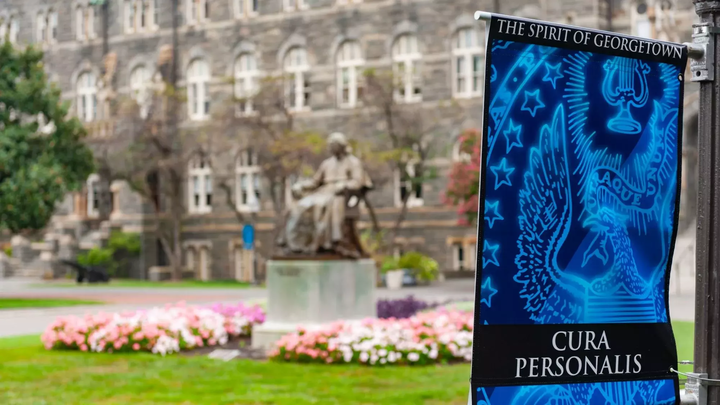When one thinks of the pre-med track, the first majors that come to mind are likely biology, chemistry or any other branch of science. Yet nearly 1,738 of the students who applied to medical school in 2021 were humanities majors — and many undergraduates are also choosing to counter their pre-med requirements with majors in history, art, philosophy and other non-science fields.

Ella Boasberg (CAS ’25), a history major on the pre-med track, said that she hopes to use her humanities background to better understand the many ways people’s pasts can affect their health.
“A history major can open up my mind to the history of issues in the healthcare field that have traumatized people for further reflection in my career,” Boasberg told The Hoya. “My major engages my brain in different ways throughout the day, and the adaptability in thinking creates more space for empathy in science.”
Bonnie Sneider (CAS ’25), a theology major on the pre-med track, said that her humanities major will help her approach medicine more holistically.
“I’m trying to expose myself to the most viewpoints possible so that I can be a human-centered physician,” Sneider said. “Making sure that I have the mental fortitude as a physician is really important, and it’s also important to help patients mentally, not just physiologically.”
Sneider came to Georgetown expecting to be an anthropology major, but was inspired to change her concentration after taking “Human Flourishing: East and West” with Erin Cline, a professor in the theology department, in her freshman year.
“She told me the way the theology department works in Georgetown is it’s like the study of the human heart, and I thought that was such a valuable perspective. What could be more useful than to understand the human heart not just on an anatomical level? There’s a lot of flexibility in the theology department that broadens theology past the concrete to soul-connection,” Sneider said.
Meanwhile, Will DiGiovanni (CAS ’25) chose to juxtapose his path as a pre-med student with an Italian major. For him, college is the time to engage in something that he cares deeply about in conjunction with his study of medicine.
“I’ve always wanted to learn to get more in touch with my Italian side, because there is a lot of really cool history on that side of my family, which I’ve always been meaning to get in touch with through the language,” DiGiovanni said.
One way DiGiovanni hopes to pursue these two interests simultaneously is through a study abroad project in Italy.
“For me specifically, if I were to do research in Italy, it’d be interesting to see what types of things they focus their research on because the healthcare systems in Italy in the U.S. are obviously very different, and the problems that are most prominent in the U.S. are not really fitting as much in European countries,” DiGiovanni said.
Boasberg, Sneider and DiGiovanni are three examples of a broader phenomenon of pre-med majors seeking additional interests. This can be a challenge, as a pre-med track typically consists of at least eight hard science classes, many of which have lab components that complement lectures. None of these classes overlap with the requirements for a major in subjects like theology or history, whereas many overlap with those for a chemistry or biology major.
This restriction means students like Boasberg don’t have the room in their schedule to fully delve into Georgetown’s wide variety of classes.
“I should be able to enjoy the liberal arts college more, but I can’t explore the curriculum as deeply as I want,” Boasberg said.
Along with the time commitment, being pre-med while a humanities major requires development of both reading and writing for humanities as well as computational skills for science. The ability to switch between the abstract and analytical expectations of science and the collaborative and thoughtful humanities is necessary for these students.
According to Jennifer Ericson, an assistant director of pre-med advising in the College of Arts & Sciences, being a humanities major doesn’t disadvantage students who wish to apply to medical school.
“We honestly think students should choose the major they want to and not worry about how med schools perceive it,” Ericson said. “All majors have benefits and challenges, whether it is science or humanities and neither is better than the other.”
Despite the added workload, students on these paths say that they feel fulfilled by pursuing their non-scientific interests while working toward medical school.
“I think science is a great means for achieving a greater purpose of understanding about the world, but personally, like, humanity’s filled a void that science couldn’t have for purpose and means in my life,” Sneider said.
While they have a difficult road ahead of them, pre-med students studying humanities have forged unique paths at Georgetown that will influence their careers in whatever field of medicine they choose to pursue moving forward.
“At the end of the day, I’m doing it for humans in the future,” Sneider said. “And so it keeps that perspective because I imagined if I didn’t have that outlet at the end of the day, I would really be missing something. My soul wouldn’t feel enriched.”








